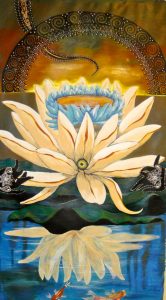 The Yogabliss on-line Moving into Meditation class met this morning. I think of you, students, during my long morning walks. I imagine you taking your own walks, being with kids or grandkids. I hear or read something and I want to share with you. Even while our on-line sharing is brief – it is precious. Thank you for your presence and generosity of spirit. Today’s practice was inspired by poets, Jane Hirshfield, Terry Tempest Williams, Mary Oliver and a scientist, Alison Gopnik, whose prose is often like poet’s. The common theme in these works is a sense of caring beyond oneself. The kind of caring a mother does for her child. In The Evolutionary Power of Children, a marvelous interview with On Being’s Krista Tippett, Alison makes the case for a universal ethic of caring much like the mother child relationship. I think this ethic of caring is alive in the ways people are supporting each other these days.
The Yogabliss on-line Moving into Meditation class met this morning. I think of you, students, during my long morning walks. I imagine you taking your own walks, being with kids or grandkids. I hear or read something and I want to share with you. Even while our on-line sharing is brief – it is precious. Thank you for your presence and generosity of spirit. Today’s practice was inspired by poets, Jane Hirshfield, Terry Tempest Williams, Mary Oliver and a scientist, Alison Gopnik, whose prose is often like poet’s. The common theme in these works is a sense of caring beyond oneself. The kind of caring a mother does for her child. In The Evolutionary Power of Children, a marvelous interview with On Being’s Krista Tippett, Alison makes the case for a universal ethic of caring much like the mother child relationship. I think this ethic of caring is alive in the ways people are supporting each other these days.
Guided Relaxation
Welcome. . . . and relax into this present moment . . . . newly arriving with each breath . . . awake and aware . . . in your body . . . your mind, your thoughts, feelings and sensations . . . If you like you can take a deep breath in . . . breathing until you are full and savoring this living energy . . . . welcome all that arrives . . . each in-breath . . . each out-breath . . . Together we form a ring of human welcome . . . answering each invitation with awareness . .
Sensing what surfaces . . . joy, sadnes,. . . even the anxious hardening of resistance . . . or the tenderness of unrequited longing . . . . Here in the sacred space of our practice we have room for it all . . .
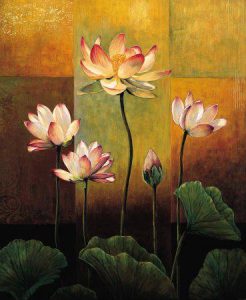 We are so blessed to answer the call of the present moment . . . we can pause our efforts to survive long enough to reflect on the meaning of our lives . . . Our search for meaning is something so essential to being human, knowing that in being born we are destined to die. In the moments of life that we have we search for beauty, for truth and for love. We touch these qualities and are touched by them – as we share them – as we co-create them together. We find courage and inspiration in those who have transformed their life experience into something that touches our hearts.
We are so blessed to answer the call of the present moment . . . we can pause our efforts to survive long enough to reflect on the meaning of our lives . . . Our search for meaning is something so essential to being human, knowing that in being born we are destined to die. In the moments of life that we have we search for beauty, for truth and for love. We touch these qualities and are touched by them – as we share them – as we co-create them together. We find courage and inspiration in those who have transformed their life experience into something that touches our hearts.
Poet Jane Hirshfield says : . . . “Ah, when we know what it is to be human, when we become able admit to ourselves our own frailties and dependence, perhaps then we will start acting and speaking in ways more fully humane.” It makes our suffering more bearable somehow – to know we are not alone. We are part of a web in which we find meaning and we also create meaning for others.
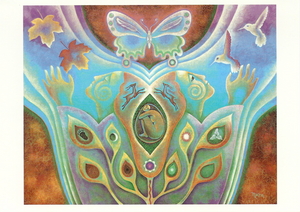 Right now we can reflect on our constellation of relationships . . . family members and friends . . . even people we don’t know that we touch with our being – through kinship, friendship or through our work . . . art . . . music . . . writing. What we do and who we become is always in relationship. And of course – our constellation is embedded in the greater web which sustains us . . . the earth and all creation. What and who touches you deeply? Where do you find meaning in these days of uncertainty?
Right now we can reflect on our constellation of relationships . . . family members and friends . . . even people we don’t know that we touch with our being – through kinship, friendship or through our work . . . art . . . music . . . writing. What we do and who we become is always in relationship. And of course – our constellation is embedded in the greater web which sustains us . . . the earth and all creation. What and who touches you deeply? Where do you find meaning in these days of uncertainty?
Terry Tempest Williams, author of Refuge: An Unnatural History of Family and place writes:
I pray to the birds because they remind me of what I love rather than what I fear. And at the end of my prayers, they teach me how to listen.
Terry reminds us that:
The eyes of the future are looking back at us and they are praying for us to see beyond our own time. They are kneeling with hands clasped that we might act with restraint, that we might leave room for the life that is destined to come. To protect what is wild is to protect what is gentle. Perhaps the wilderness we fear is the pause between our own heartbeats, the silent space that says we live only by grace. Wilderness lives by this same grace. Wild mercy is in our hands.
It is with our willingness to remain present – we can enter that silent space that says we live only by grace. When we are awake to the wild mercy in our hands we are awake to the life we’ve been given. We awaken to the wonder of being. We can appreciate the amazing living web we’re a part of.
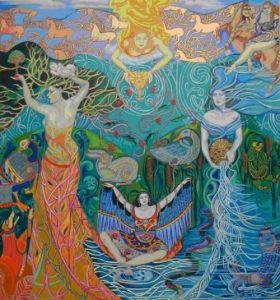 Our feeling, sensing, thinking, moving capacities are miraculous. The constellation of relationships we hold with the living world seems limitless. All has been given to us. From the basics of survival – food and water, fire and shelter to the alchemical mysteries of culture – creativity and language, medicines and even flight. How are we present for life’s blessings, for life’s daily miracles? Right now we tenderly give ourselves time – time to bring our blessings and miracles to awareness.
Our feeling, sensing, thinking, moving capacities are miraculous. The constellation of relationships we hold with the living world seems limitless. All has been given to us. From the basics of survival – food and water, fire and shelter to the alchemical mysteries of culture – creativity and language, medicines and even flight. How are we present for life’s blessings, for life’s daily miracles? Right now we tenderly give ourselves time – time to bring our blessings and miracles to awareness.
Can we remember the open mind states of babies and children? In her book, The Gardener and the Carpenter, developmental psychologist and cognitive scientist Alison Gopnik describes this state as one of profound creativity. Our children’s minds literally help us all stay creative and growing as a species. She descirbes this beginner’s mind as:
. . . the state in which we are released from the demands of exploitation. We’re released from having to think about “What do I need to do next?” And we are able to explore the range of possibilities — the . . . ways the world could be . . . different from the way the world actually is. We’re able to be open to information . . . that’s coming from the world all around us. And . . . is the state that . . .young children are in pretty much all the time. And part of what happens as we get older is that we transfer, we move, from being in that kind of state of wild exploration, and. . . we narrow . . . into this exploit phase as adults.
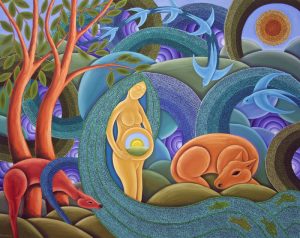 Humans devote years of caring – caring beyond themselves – caring that enables our children to learn and grow in profound ways. Caring engenders love. Relationship. Alison’s queries show that the mind of our species changes through generational change more than individual change. Our individual frailties and dependence actually contribute to our survival as a species.
Humans devote years of caring – caring beyond themselves – caring that enables our children to learn and grow in profound ways. Caring engenders love. Relationship. Alison’s queries show that the mind of our species changes through generational change more than individual change. Our individual frailties and dependence actually contribute to our survival as a species.
Alison says that “. . . science tells us is that there’s this stream, this river, this ability to change in unpredictable ways. . . . that’s what human nature is all about. Human nature is culture. What’s innate in us is our capacity to learn and change. That’s what human nature is really all about. “
So together we create our culture. Relationship. One of us is developing, exploring and growing – the other is deepening the capacity to care and to love. Both are experiencing wonder – both are creating resilience. When we pause with kind attention we affirm our resilience. We return to that state of openness and wonder.
Here, together, we intentionally choose how we will navigate our lives. We can walk slowly and bow often. We – like Mary Oliver – will choose whether to take ourselves to the forest, the mountain, the ocean – to that singular place of healing sanctuary.
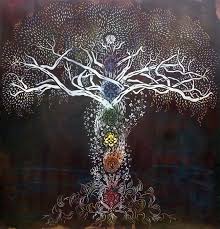 When I am among the trees,
When I am among the trees,
especially the willows and the honey locust,
equally the beech, the oaks, and the pines,
they give off such hints of gladness.
I would almost say that they save me, and daily.
I am so distant from the hope of myself,
in which I have goodness, and discernment,
and never hurry through the world
but walk slowly, and bow often.
Around me the trees stir in their leaves
and call out, “Stay awhile.” The light flows from their branches.
And they call again, “It’s simple,”
they say, “and you, too, have come
into the world to do this, to go easy,
to be filled with light, and to shine.”
